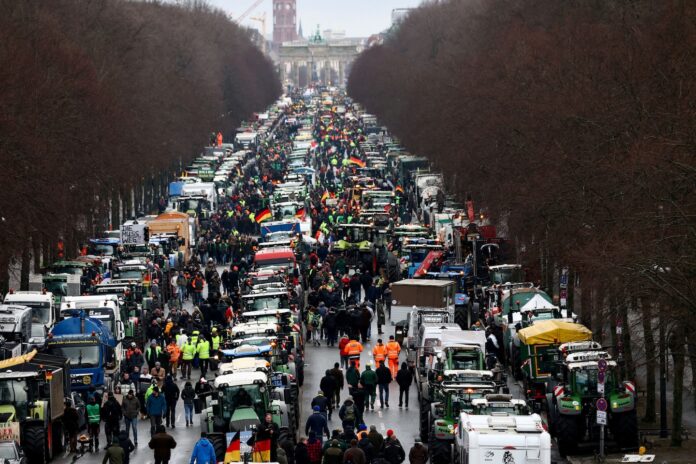Following protests in December, the government reversed a decision on axing a tax discount for agricultural vehicles, and announced that a diesel subsidy would be phased out over three years rather than being cut immediately. But the German Farmers’ Association said the concessions didn’t go far enough.
“Without stability in the countryside, without agriculture our country has no future,” German Farmers’ Association President Joachim Rukwied said from the stage. “That’s why we are prepared to take to the streets.”
While the protest was prompted by concerns in the agriculture sector, Monday’s demonstration was also an outlet for general dissatisfaction with the government, adding to the mounting pressure on Chancellor Olaf Scholz as he scrambles to fix a billion-euro budget blunder, which led to the subsidy cuts. As protesters streamed to the central meeting point, truck drivers who had turned out in solidarity blared eerie air-raid sirens into the damp Monday morning air.
Eric Krems, 36, traveled four hours on Monday with other farmers from the Oberlausitz region, southeast of the capital.
“Originally we had hoped that the cuts to the agriculture subsidies would be overturned,” said the animal and produce farmer. “But in the meantime, I think it’s clear that at this protest is about a lot more. Not only us farmers are unhappy, but other areas, too. Because what’s coming out of Berlin is damaging our county — especially the economy.”
Above the crowd, regional flags fluttered in the bitter January air alongside the black, red and gold of the national standard. One slogan in particular was repeated on the placards: “The traffic light must go!” — a reference to the governing coalition of the Social Democrats, the Free Democrats and Greens, whose party colors evoke those of a traffic light.
German Finance Minister Christian Lindner, meanwhile, was booed down by protesters as he took to the stage. “Get lost! Get lost!” chanted the crowd as they huddled together, many of them keeping warm with hot coffee and mulled wine distributed by fellow protesters. In some corners, flares were set off, sending green and black smoke across protesters’ heads.
Among the crowd was Ronny Thiele, a 43-year-old psychology student from Berlin.
“Stop the traffic light. We are the state,” read his placard. “I’m here in solidarity with the farmers. But for me it’s also important that we don’t hand all the power to individuals and that instead the power remains distributed among the people,” he said.
Ahead of the demonstration, Scholz said in a video podcast Saturday that his government had listened to the farmers’ concerns. “We’ve taken the farmers’ arguments to heart and revised our proposals. A good compromise.”
The general discontent with the German government at the farmers’ protests has also been an opportunity for far-right extremists.
Despite calling for the abolition of subsidies in its party program, the far-right Alternative for Germany (AfD), which for months has polled the second strongest party in Germany, has seized the opportunity to show solidarity with the agriculture industry.
“Fellow citizens, let’s meet on the streets!” Björn Höcke, a prominent AfD figure from the party’s more extremist wing, wrote on Facebook.
Known far-right groups including Free Saxons, the Third Way and the Homeland have also mobilized on social media in recent weeks, fueling talk of uprisings to “dismantle” the government, which Scholz described Saturday as “nonsense.”
Earlier this month, the German Farmers’ Association distanced itself from extremist groups after some 100 farmers prevented Vice Chancellor Robert Habeck from disembarking from a ferry following a private trip.
“It is becoming clear that something has started to slip in recent years, which is limiting legitimate democratic protest and freedom of expression,” Habeck said in a video posted on X, formerly Twitter. “Calls are circulating with coup fantasies, extremist groups are forming and ethnic-nationalist symbols are being openly displayed.”
Even some of the demonstrators in Berlin on Monday worried that the protests — and the country — could be hijacked by the far right.
“I’m worried that society is sliding to the right,” said Andreas Bartsch, 57, a cattle farmer attending the demonstration. “A lot of people have lost their belief in the government and then some people see only the AfD as an alternative. But things are increasingly decided up top. And those up top need to talk to people before decisions are made.”
Johannes Hillje, a political consultant at the Progressive Center think tank, said the farmers’ protests provide the far-right with the opportunity to access wider society.
“They’re looking for issues where there is a strong anti-government sentiment,” he said, pointing to similar piggyback tactics at other protests in recent years — whether against migration, covid-19 restrictions or German support for Ukraine following Russia’s invasion.
“The door is opening wider,” Hillje warned. “The door has never been so open to far-right views since the Second World War.”



